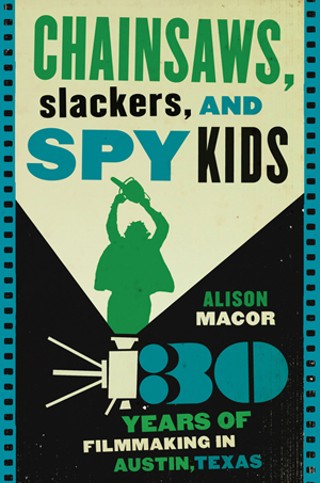Moving Pictures
Alison Macor charts 30 years of Austin history, one film at a time
By Kimberley Jones, Fri., Feb. 26, 2010
Alison Macor, a longtime Austin film journalist, never intended to write a book so close to home. In fact, she'd had her heart set on a different project entirely. While trudging through her dissertation as a graduate student at the University of Texas, Macor was sneaking off in the library stacks to read up on Thelma Schoonmaker, the legendary editor for Martin Scorsese (Macor called her side research her "geeky reward," a sentiment that can only truly be appreciated by the film-obssessed).
But when Macor approached Schoonmaker about the project, she politely demurred – turns out she was saving all her stories for her own autobiography – and Macor had to shelve her dream book. Then a chance conversation with Texas Monthly's Evan Smith sent her in a new direction: Why not think local? Macor had already been covering the Austin film beat in The Austin Chronicle, the Austin American-Statesman, and Texas Monthly.
"I'd been covering the Austin film scene at that point for about six years or so," Macor said, "and I just thought, 'Well, is there a story here that I want to write?'" That was 2001. Nine years later, on the eve of the publication of Macor's Chainsaws, Slackers, and Spy Kids: 30 Years of Filmmaking in Austin, Texas (UT Press), the answer, it seems, is a qualified yes. Not one story, but many.
At the time of Chainsaws' conception, Austin film had hit a new benchmark: Robert Rodriguez's Spy Kids, a homegrown film through and through, had enjoyed a star-studded, carnivalesque premiere (literally –they shut down Congress Avenue and turned it into a fair-park for the event) and then stormed the $100 million mark (blockbuster numbers back then). Austin's national profile raised, it seemed like a good time to set down the town's history and contemplate its future.
Might as well dash certain expectations right away: This isn't an exposé – although there are certainly juicier bits, as when Macor likens the simultaneous, fraught formations of the Austin Film Festival and the South by Southwest Film Festival to "the heightened drama and bad behavior" of high schoolers. Nor is it a rah-rah piece of boosterism, though Macor clearly admires the highly insular community she's chronicling. Instead, Chainsaws is a 384-page, exhaustively researched and thoughtful work of scholarship.
Macor neatly charts the evolution of Austin into a regional filmmaking hub via a 10 chapters/10 films approach. With a notable aside to turn-of-the-century film pioneers the Tilley brothers (turn of the 20th century, that is), Macor kicks off with Tobe Hooper's The Texas Chain Saw Massacre (see excerpt "The Last Supper") and winds down with Spy Kids, all the while folding in defining events and institutions, such as the Austin Film Society's sometimes stutter-stepping transformation. (Chapter 3, "Made in Austin," covers Bill Wittliff's Western Red Headed Stranger and the founding of The Austin Chronicle; on the subject of sharing space with Willie Nelson, you'll hear no complaints from us.) Macor landed interviews with major filmmakers, including the usual suspects (Mike Judge, Quentin Tarantino, Richard Linklater) and the not-so-usual suspects (George Lucas). Not to mention the sentimental favorites – the cast and crew and just plain personalities who have helped define the town (Wooderson, anyone?).
"It took me a year and a half to get that interview with Matthew McConaughey," Macor remembers. "And then he didn't call when he was supposed to. It was just a Wednesday afternoon and I happened to pick up the phone. And he was like, 'It's Matthew.'" Macor drew a blank. "McConaughey," he clarified. "And I thought: 'Oh. Okay. We're going to do the interview right now.'"

And then there was the question of Austin's identity, a trickier and trickier thing to pin down in the new century, as the population exploded and a tightly knit community noticeably frayed with the expansion. "Early on, I realized that this was a book as much about Austin as a character as anybody I wrote about," says Macor. "And it was really important for me to research Austin culture. That was actually a really fun part of the book.
"There's this great book that came out in the Fifties called To Wear a City's Crown. The author [Kenneth Wheeler] sort of looked at San Antonio, Dallas, Houston, and Austin and argued that their personalities were set very early on in each city's development. And I thought that was so fascinating. What he discovered about Austin was that while other cities like San Antonio in the 1800s were campaigning to get the railroad or were really trying to get a hold on production and bring industry in, Austin was kinda like: 'If it comes here, great. If it doesn't ... eh.' And I just thought, 'That's really amazing.' And I think partly because Austin enjoys its cool status, it doesn't want to go over to the other side. There will always be that tension."
That tension has come to define Austin in these past 30 years, the competing impulses to continue to hang tough to the scrappy/slacker attitude and aesthetic, which some may argue is as disingenuous as the alternative, or to become what's been so long predicted, or at least longed after, in snappy sloganese: The Third Coast. Hollywood, Texas. No definitive answers here –the future, after all, is ever in flux – but Macor does the best she can reading the tea leaves.
"The one part of the book that I worked over and over again was the conclusion, because I was always trying to update it according to when the book might come out. I feel good about the few names I mentioned who are working now and the next-next generation" – Macor glances on mumblecore, Fantastic Fest, and Luke Savisky in Chainsaws' final pages – "but there are so many other people who could have been mentioned: Bob Ray, so many good documentary filmmakers.
"Last year, I was looking at the people who were going to be at the Austin Film Festival. And there was a name in there of a student who I had taught when he was 10 in a film literacy/production class. And he had a film in the festival! I think that's part of Austin's film survival thing, you know? It's just going to keep happening."
In short, the future of Austin film has less to do with a Left Coast stamp of approval or an overexcited hometown press cooking up catchphrases and everything to do with the town's ability to continue to foster new talent, brass-tacks-and-bootstraps style. And, no surprise, the measures put into place by the older guard –the Texas Film Commission, a vital film school, the Texas Filmmakers' Production Fund, etc. – go a long way in making sure there's a new guard to come. In researching the book, Macor says she was continually struck by the names and institutions that reappeared, the constellation of people that linked one production to another.
"I was amazed at the number of connections, the real foundation in place here now. The fact that some of Rick's films went through the same circuit as Eagle Pennell's films. And that's not to say they're identical filmmakers or anything – it's just to say that, you know, generations have been created. I think that's a really amazing thing. I guess that's what I was talking about with that former student of mine. This is going to keep going, no matter what happens.
"I don't think there's a big endpoint, an 'Austin, Hollywood, cue the music, ta-da!' kind of thing. I think it's just going to keep generating these people who make movies and find a supportive community here."
Chainsaws, Slackers, and Spy Kids: 30 Years of Filmmaking in Austin, Texas will be published March 1 by the University of Texas Press. Alison Macor will be at BookPeople on Sunday, March 7, at 3pm for a reading and signing.













